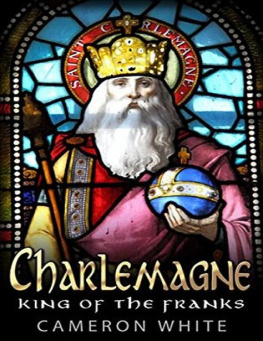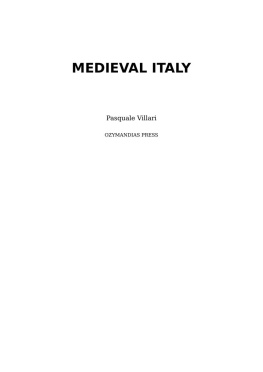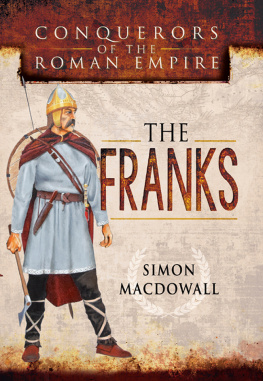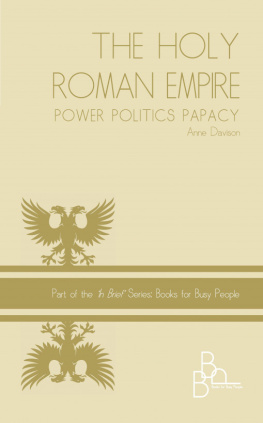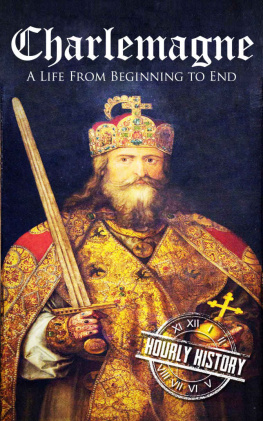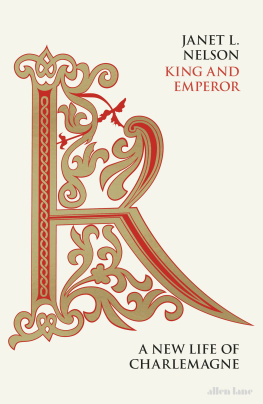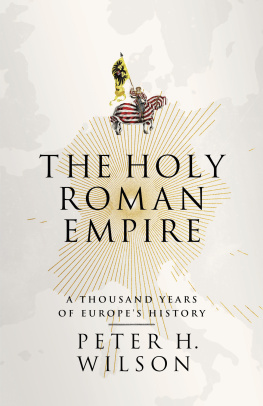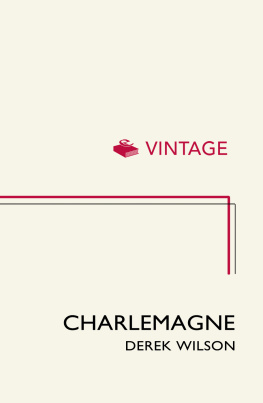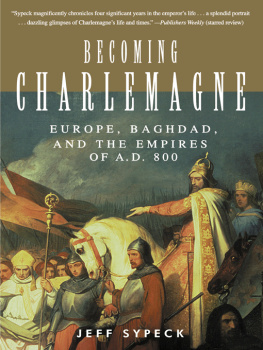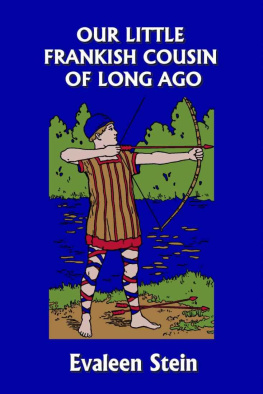Charlemagne
King of the Franks
By Cameron White
Copyright 2015 by Make Profits Easy LLC
profitsdaily123@aol.com
Table of Contents
Introduction
Very little is known of the latter part of the period in European history known as the Dark Ages. There is a vast amount of European history that remains blank due to low literacy rates and a lack of written record-keeping.
By the mid 8th century no centralized European authority had yet arisen to take the place of the Roman Empire since its collapse. But in Germany, the Frankish dynasty began to establish itself and eventually their kingdom covered most of modern day France as well as other parts of Central and Eastern Europe.
In the midst of all of the chaos to control the land, one individual stood at the heart of the Franks expansion: Charlemagne. A pious and arrogant leader, he made such an impact on the world he is still arguably one of the greatest kings to have ever ruled.
Charlemagne established his dynasty and elevated his familys influence throughout Europe. His is a story full of violence and heroism, displaying political, social, and religious advances. It is a story that exhibits what it takes to be a king during a time in history when it was difficult to amount to anything at all. The achievements and future improvements of the world in multiple areas such as religion, education, architecture, military, art, and politics cannot be accredited to any other figure other than the medieval King of the Franks, Charles the Great.
Chapter 1: The Birth of Charlemagne
We must begin with the birth of Charlemagne, a moment in history regarding which we have relatively little information. We need to proceed with caution; some information has possibly been fabricated to cast him in a better light. In other words, there are moments in the historical record where the facts put down by historians are obviously propagandistic. Some effort has been made to weed these out of the following account.
It is argued by some scholars that Charlemagne was born in 742, but it is generally accepted that his parents were only married in 744. In the world today, it is common for people to have children before being married, but that would not have been allowed during that time period, especially in the upper echelons of society. There is a theory that his mother and father may have married in 740, although it is important to point out that few individuals believe this to be the actual case.
A likelier date for his birth is 747, which has been suggested by various scholars. However, one of the most acclaimed resources connected to his life states that Charlemagne was in his 70s when he died, which would not have been possible if he had been born in 747. Strangely enough, there is more agreement over the date of April 2nd than there is over the actual year of his birth.
Strictly speaking, there are two options: either he was younger than initially believed when he died or he was an illegitimate child. Considering the stigma that would be attached to the mere fact of illegitimacy, it is easy to see how some people may wish to cast doubt on his date of birth to strengthen his claim to the throne.
His Birthplace
Just as there is some confusion over his date of birth, the same issue arises when attempting to determine his birth locale. The locations suggested are currently in two completely different regions, with Liege, in modern Belgium, being touted as one option, and Aachen, in present day Germany, being the other one. Indeed, the official biographer of Charlemagne, Einhard, does not give a clear answer, but confuses the issue further. In actual fact, Einhard's official biography is our best source of evidence for the life of Charlemagne, though it is important to keep an eye on how accurate a portrayal it is since it would clearly want to paint Charlemagne in a positive light wherever possible.
There is no evidence available that can be used to confirm or deny either suggestion. However, both Aachen and Liege are known to have produced the royal families of the Carolingian and Merovingian dynasties, which lends their claims some credence.
The Early Life of his Father
Considering the status of his family, there are strangely limited resources available that provide insight into the early years of Charlemagne. However, the stories connected to him when he came to power help us to determine the kind of upbringing he must have had.
Charlemagne was the son of Bertrada of Laon and Pepin the Short, also known as Pippin III. His father was part of the court of the Merovingian King, which afforded him a certain degree of power; he held the title Mayor of the Palace, or effectively the first citizen in the kingdom.
At the time of Charlemagnes birth, the Merovingian King, Childeric III, ruled the Franks and Pepin had just inherited the role of mayor from his own father, Pippin II, the previous year. However, Pepin also had a brother, Carloman, who was intended to take over the role of mayor, although he joined a monastery after a couple of years in power.
Upon inheriting these positions from their father, it was decided that the two brothers would split their area of influence to make things fair for both parties. This led Pippin III to take control of the areas of Burgundy, Neustria, and Provence while Charlemagne initially took control of Alemannia, Austrasia, and Thuringia. However, after Carloman became a monk in 747, Pippin III became the sole ruler of the entire Frankish kingdom.
Understanding Their Power
It is interesting to note that two Mayors had so much power. The Merovingian Kings were largely figureheads. It is argued by scholars that there had not been a real King of the Merovingians since 737.
In fact, the office of Mayor of the Palace started off merely as a title belonging to an officer of the royal household, but through time and careful manipulation, Pepin III's ancestor expanded their influence until ultimately they held more power than the King himself.
The family of Charlemagne was very rich and powerful long before they established the Carolingian dynasty and began to rule in name as well as in deed. For example, Pippin III and his brother Carloman placed Childeric III on the throne in 743, the very king they would later depose.
Pepin faced additional obstacles in his rise to power, such as his half-brother Grifo, who was born to a mistress and, therefore, ineligible for inheritance. However, Grifo did not take kindly to this exclusion and attempted to usurp power from both Pippin III and Carloman.
After Pepin's death in 741, Grifo rebelled immediately spearheading a series of revolts against his brothers. There were a number of times when Grifo was caught and imprisoned, but he was released rather than executed. Even after Carloman became a monk in 747, the rebellions did not cease. They only ended after Grifo was killed in battle in 753.
It is important to point out that Grifo was not the only instigator of rebellions during the first few years that Pippin III and Carloman were in control. In fact, it is known that different tribes rose up across the kingdom and had to be subdued time and time again. This information sets the scene for what followed when Charlemagne took over.
With the revolts, especially the rebellions in Alemannia in 742, Bavaria in 743 (under the command of Odilo), the Saxons in 744, Aquitaine in 745, and then Alemannia once more in 746, the Merovingian kingdom was almost constantly having to deal with revolts. Luckily for the king he was not responsible for crushing rebellions due to his lack of power.
Taking Complete Control
As previously mentioned, the brother of Pippin III was extremely religious and wished to enter a monastery, which he did in 747. It is important to know that the Franks had been Christians since approximately 599, despite the fact that Christianity was not yet established as the official religion in all of Europe. The Franks were the only Christian kingdom in Western Europe; the rest were still in the process of converting from paganism to Christianity.
Next page
